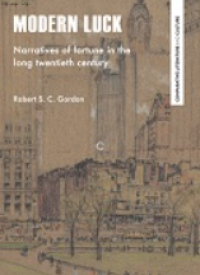
Text
E-book Modern Luck: Narratives of Fortune in The Long Twentieth Century
Penilaian
0,0
dari 5Luck is all around us.1 There is a certain school of cultural anthropology that is intent on tracking the structures, categories and beliefs that recur across all human societies, transcending the profound differences in history and culture that separate them. This school of ambitious universalists – which is by no mean uncontroversial, both within the field of anthropology and beyond – seems to be looking for something like the cultural core of what it is to be human, perhaps even for hints of a deep genetic matrix for human consciousness itself. One of the most influential among them, Donald Brown, produced a compendium of these phenomena in a book of 1991, and in among his four hundred or so instances of what he calls these ‘human universals’, we find ‘beliefs about fortune and misfortune’.2 In other words, beliefs about luck.I have little doubt that that every single reader of this book has an instant, intuitive and relatively untroubled sense of knowing what I mean when I talk about luck, a notion so familiar, so pervasive and so usefully loose and plural in its meanings as to constitute no less than the very stuff of (almost) everything that happens to us in our lives.3 Luck can be good or bad, can be mapped onto anything and everything that befalls us (‘falling’ is a motif knottily tangled up with our cultural conceptions and lexicon of luck, as we shall see), without our knowing quite why. Luck is a relatively free hit, too: we can evoke it on any number of occasions and for any number of reasons, as a consolation, as a celebration, as a declaration of (false?) modesty, as an explanation of how things we have not understood have come to pass, and of how we feel about them: ‘just my luck!’, ‘it was a lucky break’, ‘hard luck’, ‘my luck was in’. It designates an event in our lives and an affect attached to the event. It is malleable, meaningful, touching, accessible and, as Brown tells us, ubiquitous.But luck is also nowhere and nothing at all. At some level, just beyond the easy everyday recourse to it and our shared intuitive sense that it shapes everything that happens to us, we know that luck is a shorthand for nothing very much, a nonsense or a fantasy, an empty vessel or at best a placeholder for and a deflection away from more troubling and more complex matters about human lives. If luck comes to mean more or less everything that happens to us, it is hard to say that it means anything at all. Its contours are too loose.
Ketersediaan
Informasi Detail
- Judul Seri
-
-
- No. Panggil
-
800 GOR m
- Penerbit
- London : UCL Press., 2023
- Deskripsi Fisik
-
188 hlm
- Bahasa
-
English
- ISBN/ISSN
-
9781800083592
- Klasifikasi
-
800
- Tipe Isi
-
text
- Tipe Media
-
computer
- Tipe Pembawa
-
online resource
- Edisi
-
-
- Subjek
- Info Detail Spesifik
-
-
- Pernyataan Tanggungjawab
-
-
Versi lain/terkait
Tidak tersedia versi lain
Lampiran Berkas
Komentar
Anda harus masuk sebelum memberikan komentar
 Karya Umum
Karya Umum  Filsafat
Filsafat  Agama
Agama  Ilmu-ilmu Sosial
Ilmu-ilmu Sosial  Bahasa
Bahasa  Ilmu-ilmu Murni
Ilmu-ilmu Murni  Ilmu-ilmu Terapan
Ilmu-ilmu Terapan  Kesenian, Hiburan, dan Olahraga
Kesenian, Hiburan, dan Olahraga  Kesusastraan
Kesusastraan  Geografi dan Sejarah
Geografi dan Sejarah